|
|
|
Sort Order |
|
|
|
Items / Page
|
|
|
|
|
|
|
| Srl | Item |
| 1 |
ID:
159189
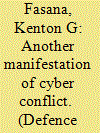

|
|
|
|
|
| Summary/Abstract |
Cyberspace is an avenue of approach through which a military force can attain objectives of value. Through these cyber avenues of approach, military forces can engage, vet, organize, and direct human agents to accomplish specific activities. Although the objectives of these activities could differ from traditional military objectives, they still have military relevance. This particular manifestation of cyber conflict is neither a new domain of war nor something outside of warfare. Rather, it can be viewed as an emerging avenue of approach in the larger context of military operations, auguring benefits in the integration of cyber activities with operations.
|
|
|
|
|
|
|
|
|
|
|
|
|
|
|
|
| 2 |
ID:
104024
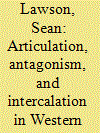

|
|
|
|
|
| Publication |
2011.
|
| Summary/Abstract |
This article provides a discursive grounding for understanding the construction of military imaginaries by adding the concepts of 'antagonism' and 'intercalation' to articulation theory. By examining the cases of industrial-mechanized warfare theory and network-centric warfare theory through the lens of this expanded articulation theory, it is argued that military imaginaries often serve to define and link conceptions of science, technology, society, economy, war, and military organization, thought, and practice into a unified image of the larger security environment - that is, the military imaginary. Military imaginaries often share a common narrative structure that privileges co-periodized change among the elements of the articulation, resulting in the phenomenon of 'antagonism' serving as a generic threat used to justify military modernization and even the use of force.
|
|
|
|
|
|
|
|
|
|
|
|
|
|
|
|
| 3 |
ID:
142605
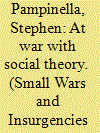

|
|
|
|
|
| Summary/Abstract |
As US counterinsurgency campaigns draw to a close, doctrine for asymmetric warfare written during the War on Terror has come under heavy criticism. While many have argued that this shift to ‘winning hearts and minds’ is evidence that the United States is taking humanitarianism and nation-building seriously, others argue that a wide gap exists between US counterinsurgency doctrine and the protection of civilians afflicted by conflict. In this article, I show that the latter is true by comparing theories of instrumental and communicative action to US doctrine for operational design, stability operations, and counterinsurgency. I argue that these texts treat the people as an object to be manipulated for the achievement of pre-determined self-interested strategic goals rather than members of a community that jointly designs operations to fulfill shared objectives. However, US doctrine does contain communicative elements that, if prioritized, would better support humanitarian and state-building objectives otherwise subordinated in the War on Terror.
|
|
|
|
|
|
|
|
|
|
|
|
|
|
|
|
| 4 |
ID:
116260
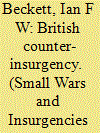

|
|
|
|
|
| Publication |
2012.
|
| Summary/Abstract |
The article aims to offer a survey of the historiographical analysis of British counter-insurgency practices and campaigns since the publication of Armed Forces and Modern Counter-insurgency, edited by the author and the late John Pimlott in 1985. It is argued that the volume in question was influential at a time when there was little academic interest in counter-insurgency in Britain. Moreover, the subject generally had been little studied in Britain in the past beyond work by a handful of military writers and theorists. Arguably, the analytical framework followed in Armed Forces and Modern Counter-insurgency holds its value even after over a quarter of a century. Since the 1980s, however, it has become apparent that the subject is of increasing academic interest, not least in terms of the ongoing debate on the nature and application of the concept of 'minimum force' in British campaigns.
|
|
|
|
|
|
|
|
|
|
|
|
|
|
|
|
| 5 |
ID:
114445
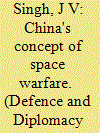

|
|
|
|
|
| Publication |
2012.
|
| Summary/Abstract |
Space warfare will be an integrated part of battle planning by the
Chinese People's Liberation Army (PLA) in any future conflict. One
of the major proponents of integrated space power for the PLA, Maj
Gen Cai Fengzhen, believes that control of portions of outer space is
a natural extension of other forms of territorial control, such as sea
or air control. China's contemplation of the military use of space has
focussed on two broad areas, namely, how to use space in military
operations to increase its offensive capability, and how to use space
in military operations to deny space capabilities to adversaries
|
|
|
|
|
|
|
|
|
|
|
|
|
|
|
|
| 6 |
ID:
148373
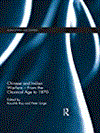

|
|
|
|
|
| Publication |
Oxon, Routledge, 2015.
|
| Description |
xiv, 379p.hbk
|
| Series |
Asian States and Empires
|
| Standard Number |
9780415502443
|
|
|
|
|
|
|
|
|
|
|
|
Copies: C:1/I:0,R:0,Q:0
Circulation
| Accession# | Call# | Current Location | Status | Policy | Location |
| 058854 | 355.020951/ROY 058854 | Main | On Shelf | General | |
|
|
|
|
| 7 |
ID:
156674
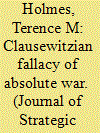

|
|
|
|
|
| Summary/Abstract |
Clausewitz was much preoccupied with the apparent contradiction between real and absolute war. Why did war in history so rarely exhibit the extremes of violence and energy implied in the pure concept of war? Clausewitz’s commentators have usually followed him in thinking that this was a genuine problem in need of a solution, but I want to question that view. I will argue that Clausewitz did not have a coherent philosophy of absolute war, and therefore the contradiction he posited between real and absolute war was equally meaningless – as, too, was his effort to resolve it by claiming that some real wars approached or even attained the absolute form of war. The real problem was not the opposition of real and absolute war, but the self-contradictory theory of absolute war.
|
|
|
|
|
|
|
|
|
|
|
|
|
|
|
|
| 8 |
ID:
140434
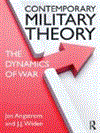

|
|
|
|
|
| Publication |
Oxon, Routledge, 2015.
|
| Description |
viii, 205p.: ill.pbk
|
| Standard Number |
9780415643047
|
|
|
|
|
|
|
|
|
|
|
|
Copies: C:1/I:0,R:0,Q:0
Circulation
| Accession# | Call# | Current Location | Status | Policy | Location |
| 058283 | 355.0201/ANG 058283 | Main | On Shelf | General | |
|
|
|
|
| 9 |
ID:
077334
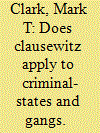

|
|
|
|
|
| Publication |
2006.
|
| Summary/Abstract |
Criminal-States and Criminal-Soldiers present unique problems for contemporary international political theory. This essay examines the applicability of the theory of war developed by Carl von Clausewitz to Criminal-States and Criminal-Soldiers. As modified by Aristotle's idea of justice as the basis for the political community, this essay proposes that Clausewitz's famous connection between politics and war holds where such states and soldiers evince political behavior. Some contrasting implications for states and state leaders are examined when such entities evince - and do not evince - political behavior
|
|
|
|
|
|
|
|
|
|
|
|
|
|
|
|
| 10 |
ID:
092061
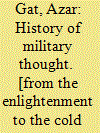

|
|
|
|
|
| Publication |
Oxford, Oxford University Press, 2001.
|
| Description |
xiii, 890p.
|
| Standard Number |
9780199247622
|
|
|
|
|
|
|
|
|
|
|
|
Copies: C:1/I:0,R:0,Q:0
Circulation
| Accession# | Call# | Current Location | Status | Policy | Location |
| 054570 | 355.02/GAT 054570 | Main | On Shelf | General | |
|
|
|
|
| 11 |
ID:
108712
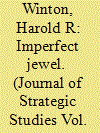

|
|
|
|
|
| Publication |
2011.
|
| Summary/Abstract |
This article explores a perennial theme in the literature of strategic studies: the relationship between military theory and the military profession. It begins with a conceptual analysis of this relationship. It then investigates what military theorists themselves have had to say about the utility of their craft. It concludes by assessing the actual influence of military theory on selected individuals and institutions. The individuals are George S. Patton, Jr., and Ulysses S. Grant. The institutions are the United States Army and the United States Air Force in the late twentieth century. The fundamental finding is suggested in the title: military theory can indeed be quite useful in the maturation of military commanders and in the development of martial institutions, but it is not always necessary and by no means perfect. It should thus be studied assiduously but used with caution.
|
|
|
|
|
|
|
|
|
|
|
|
|
|
|
|
| 12 |
ID:
115813
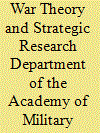

|
|
|
|
|
| Edition |
1st
|
| Publication |
Beijing, Xinhua Book Store, 2009.
|
| Description |
562p.
|
| Contents |
Text in Chinese Language
|
| Standard Number |
9787802372221
|
|
|
|
|
|
|
|
|
|
|
|
Copies: C:1/I:0,R:0,Q:0
Circulation
| Accession# | Call# | Current Location | Status | Policy | Location |
| 056907 | 355/WAR 056907 | Main | On Shelf | General | |
|
|
|
|
| 13 |
ID:
189859
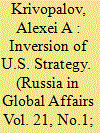

|
|
|
|
|
| Summary/Abstract |
The author looks at the collection of essays entitled On Strategy: A Primer
(2020) as an insight into U.S. policies and strategy. These two basic levels
are invariably present in any armed conflict; however, the purpose of this
article goes beyond the boundaries of a standard review. At first glance,
the problem of effectively blending foreign policy and strategy may seem
groundless, far-fetched, and completely out of touch with reality. The author
argues that this impression is misleading. The inaccurate distribution of
responsibilities between policy and strategy and the tendency to constantly
confuse their functions potentially poses serious risks even to such a
superpower as the United States. An unbiased glance cast from a distance
gives a better view of the prerequisites for mutual alienation of the political
and strategic horizons of U.S. military efforts.
|
|
|
|
|
|
|
|
|
|
|
|
|
|
|
|
| 14 |
ID:
109489
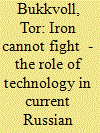

|
|
|
|
|
| Publication |
2011.
|
| Summary/Abstract |
Contemporary Russian military theory is dominated by three schools of thought: the 'traditionalists', the 'modernists' and the 'revolutionaries'. On the role of technology in future warfare, the traditionalists argue for both high tech and massive forces at the same time. The modernists are ready to trade manpower for technology, whereas the revolutionaries give technology full priority. Both the traditionalists and the modernists believe Russia, because of the country's technological lag and limited resources, should respond asymmetrically to the Western technology challenge. The revolutionaries, on the other hand, maintain that Russia must respond in kind. If not, the country will no longer be able to defend its sovereignty. The currently ongoing radical reform of the Russian military is a partial victory for the modernists, but which model or mix of models that will dominate in the future is first of all dependent on the Russian military's purchasing power and the state of the domestic defence industry.
|
|
|
|
|
|
|
|
|
|
|
|
|
|
|
|
| 15 |
ID:
121921
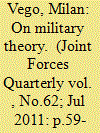

|
|
|
| 16 |
ID:
109991
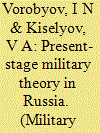

|
|
|
|
|
| Publication |
2011.
|
| Summary/Abstract |
The authors assess the results of the military reform aimed at giving the Russian Armed Forces a new makeup, highlight the resultant problems in military theory, and suggest a number of solutions.
|
|
|
|
|
|
|
|
|
|
|
|
|
|
|
|
| 17 |
ID:
160723
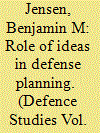

|
|
|
|
|
| Summary/Abstract |
Which ideas shape defense planning and why? The following paper builds on over 80 interviews with senior defense officials to dissect the origin, evolution, and fall of the Revolution in Military Affairs (RMA), a major post-Cold War US defense innovation paradigm. In studying the emergence and diffusion of the RMA concept, my research suggests a central role for collective actors sharing constitutive ideas about practice and competing for legitimate authority and influence in the defense establishment. The rise of the RMA as an organizing idea in U.S. defense planning is thus not reducible to bureaucratic competition, technological determinism, or strategic culture as an external set of norms. Rather, it can be portrayed as a social process involving boundary activation by bureaucrats and soldiers (re)interpreting their key tasks and core missions for future war.
|
|
|
|
|
|
|
|
|
|
|
|
|
|
|
|
| 18 |
ID:
125050
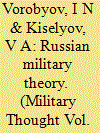

|
|
|
|
|
| Publication |
2013.
|
| Summary/Abstract |
The paper traces the formation of the Russian military theory, and highlights the problems of its development that occurred at various times, including at the present stage.
|
|
|
|
|
|
|
|
|
|
|
|
|
|
|
|
| 19 |
ID:
116251
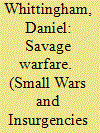

|
|
|
|
|
| Publication |
2012.
|
| Summary/Abstract |
In his classic book Small Wars: Their Principles and Practice (1896), the military theorist Charles E. Callwell divided small wars into three broad classes: wars of conquest were fought to expand empires; pacification campaigns were internal, and often followed campaigns of conquest; campaigns to wipe out an insult, avenge a wrong, or overthrow a dangerous enemy, often developed into wars of conquest. While all three categories involved major political considerations, Callwell's text is often criticised for its lack of discussion of politics. However, Callwell recognised that, if the ultimate objective of a campaign was successfully to assimilate a people into the British Empire, then 'military intimidation' was ill adapted to that end. This article will argue that a strategy of 'butcher and bolt' was indeed considered by many commentators, including Callwell, to be the best way to win 'hearts and minds'. This stemmed from a belief in the all-importance of 'moral effect', a recurring theme in small wars literature. However, to view the British approach to colonial small wars as pure and simple brutality, in a 'dark age' before a more enlightened period of 'minimum force', is an oversimplification.
|
|
|
|
|
|
|
|
|
|
|
|
|
|
|
|
| 20 |
ID:
099509
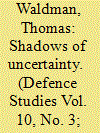

|
|
|
|
|
| Publication |
2010.
|
| Summary/Abstract |
The concept of chance has often been approached by military thinkers in either an unreasonably fatalistic or complacently dismissive manner. However, Carl von Clausewitz (1780-1831) developed a more accurate and realistic conception. For him, chance in war is an inescapable yet ambiguous phenomenon: it can create opportunities to be exploited or equally dash the best laid plans. Frequently disregarded in theory, Clausewitz maintained that chance, uncertainty, and friction are central to the nature of war, along with the human qualities required to overcome them such as courage, determination, and adaptability. Modern developments have not rendered these insights obsolete and, if anything, they hold even greater relevance to contemporary warfare. Western militaries fighting in Iraq and Afghanistan have been continually challenged by chance events and unforeseeable setbacks. Overconfidence bred by technological superiority has contributed to militaries inadequately capable of confronting unexpected developments in all of war's dimensions. Understanding Clausewitz's ideas can help prepare military leaders for the unpredictable in war.
|
|
|
|
|
|
|
|
|
|
|
|
|
|
|
|
|
|
|
|
|